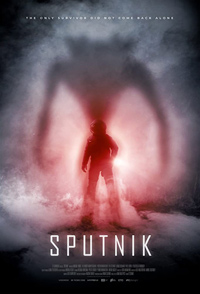This Time It’s Cold War: Abramenko Revamps a Xenomorph with Effective Potboiler
 Just when you think a familiar formula might have run all its potential courses and configurations comes a surprisingly fresh take on extraterrestrial terror with Egor Abramenko’s simple but inspired debut, Sputnik.
Just when you think a familiar formula might have run all its potential courses and configurations comes a surprisingly fresh take on extraterrestrial terror with Egor Abramenko’s simple but inspired debut, Sputnik.
A Soviet horror film which will unavoidably be compared to Ridley Scott’s 1979 landmark Alien, Abramenko takes advantage of period (and continual) bureaucratic anxieties for a simmering invasion film which takes place during the final decade of the Cold War but also mines the formidable historical legacies of both the Space Race and the secret development of weapons of mass destruction. A trio of noted Russian performers paired with some fantastic special effects coalesce into one of the best hybrids of creature feature and body horror since the early days of David Cronenberg.
In early 1983, Soviet spacecraft Orbit 4 crash lands when its mission goes awry. Of the two men on board, only Konstantin (Pyotr Fydorov) survives, but something came back in their craft with them. Shuttled off to a secret compound where he’s scrupulously monitored by a team of scientists commanded by Semiradov (Fedor Bondarchuk), their team has hit a dead end in their studies and time is running out before Moscow decides to terminate their studies on Konstantin. But Semiradov becomes aware of young psychologist Tatyana (Oksana Akinshina), who’s about to lose her medical license thanks to employing controversial, arguably unethical methods. Assuming he’s found someone who will prize the patient’s progress over governmental regulations, Semiradov recruits Tatyana, who agrees to participate only to find she’s gotten herself into a situation more dangerous than she’d bargained for.
Sputnik, the Russian word for both spouse and travel companion (which adds to the strange perversity of the narrative) succeeds in creating both the dread and suspenseful desire which Ridley Scott himself hasn’t been able to recreate in his ongoing prequel series to his 1979 classic. This is partially due to an expertly crafted script from Oleg Malovichko (Attraction, 2017) and Andrei Zolotarev, thanks to their ability to elevate the narrative’s B-movie trappings and create an intelligence which channels the isolated horrors of Carpenter’s classic remake of The Thing (1982).
The project was produced by Fedor Bondarchuk (Stalingrad, 2013; Attraction, 2017), a mainstream Russian director who has assumed the multiplex position once occupied by Timur Bekmambetov in his country with large scale productions which sometimes bear the markings of propaganda (particularly with his adaptation of Vasily Grossman’s classic novel, a narrative which rivals the scope of Tolstoy’s War and Peace).
As Semiradov, the commanding officer in the secret Soviet compound, Bondarchuk’s presence in front of the camera is of a pronounced and profound aura of menace, like Werner Herzog in Fascist mode. He’s joined by Oksana Akinshina, the titular lead of Lukas Moodysson’s miserabilist classic Lilya 4-Ever (2002), here playing a cold but brilliant and resilient icy blonde psychologist who’s just the right amount of rebellious to be tapped by Semiradov. As the love interest/victim, Pyotr Fyodorov (of Stalingrad; The Duelist, 2016) is mostly a prop until the final act, which demands a believable attraction to build between himself and Tatyana. While the strength of their ‘bond’ isn’t quite impassioned, Abramenko does keep a necessary essence of ambiguity concerning whether their attraction is real or potentially a manipulation by a deadly parasite.
Of course, the real selling point is the creature crafted in Sputnik, a large, slithery snake-like alien which takes on the shape of a many-eyed cobra, its alabaster skin shimmering. Feeding on certain hormones in the human brain, it’s methods of obtaining food while using Konstantin’s body as a host are quite gruesome, and lend to the necessary nightmarish element required to keep these kinds of narrative’s memorable and compelling (see Daniel Espinosa’s 2017 title Life as an example of how easily these types of films feel rote). But if you’re looking for a horror/sci-fi film that feels fresh, effective and fascinating, you’ve found your new traveling companion.
★★★★/☆☆☆☆☆


